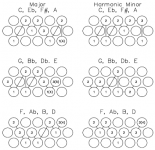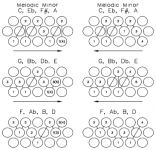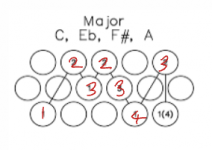Stephen said:
In Belgium we don't have those chauvinistic or nationalistic reflex regarding music education.
When you live in a country like Belgium, you look over the borders and try to learn from other countries.
Didacticts, pedagogy, fingering techniques,... Are the results of international evolutions.
One misses out on a lot of experience If accordionists don't study the German and Russian CBA traditions.
Especially the most recent tutors from the 1980s to present.
With the internet shops, every German, Russian, French accordion method book can be purchased day and night.
Anyone can send emails to continental accordion teachers and ask them what method books they use in public music schools.
But I guess Nigel, Boris and Don Trumpet won't care.
These guys will blow the trumpet behind walls ;-)
We also have the USA or UK in our shops.
Every guitar or mandolin amateur in Europe will look out for USA collectors items from the USA or Britain.
You don't need to be fluent in German or Russian to learn from their accordion tutor books.
This is neither the time nor place for cheap snide political jibes. However, since you bring it up I will remind you that you or your ancestors were quite happy to have your country salvaged by the efforts of my grandfathers and uncles in two world wars. I am fluent in French, and can manage in German, Danish, Italian and Spanish. I have worked in Europe, but I am not happy with the “ever greater union” peddled by the EU enthusiasts. I voted to leave the EU on both occasions when I could. That is my democratic right. A right which is being daily denied by those who think they know better. I forbear to comment on the deficiencies of other nations’ polities. I would be grateful if you will return the compliment.
Incidentally, Chauvin, from whom the term chauvinism derives is, so far as can be told, a mythical character. His origin is often said to be Charente Maritime, but given his non-existence, he could just as easily have been a Walloon. Not, then, part of Belgium, as the Napoleonic wars antedate the country’s foundation.
If you’d read my initial post you would see that I referred to a number of European guides. Some are available in English, others in French. Naturally English is easier, but French is not a problem. I now have sufficient tutorials in French and English to be going on with, though I might investigate German ones in future.
WilliamKErickson said:
Hey ChrisRayner,
I know this discussion is a little old, but I just ran across it after picking up a CBA and I'm trying to decide what tutorial book to start with. Would you mind terribly putting down the fingering for the C major scale (Thumb = 1) from each of the three books you mention: Anzaghi, Lucien&Richard Galliano, and Manu Maugain? That way I could try them out and then start with the book with the fingering that seems the best fit for me (I know from your earlier discussion you decided to go with Anzaghi).
Any other comments about the approaches in each book would be greatly appreciated!
Thanks!
Bill.
Bill,
It’s not just C major. The principle I am following in my progress is to learn scales, initially, in the outer three rows. So I am looking at fingering for the scales of G, F, and C major. It was a combination of all the fingerings which lead me to choose Anzaghi. I really don’t want to copy out the fingerings for nine scales. I’m over seventy now, and time is not on my side. If you are really keen PM me and I’ll reply with photos of the relevant pages. They are, of course, copyright and posting them here would be improper.
As a beginner I would recommend you to see if you can find a teacher. He or she should be able to recommend a tutorial book, and you will probably find, as I have, that the tuition will aid your progress in many different ways. Actually, there’s more in the books than just fingering, and, even if you buy all you can get sight unseen, I suspect you’ll find them good value for money.
In fact my tutor is using pieces and exercises from Palmer-Hughes mostly, which is for piano accordion. I have been obliged in a few cases to obliterate the fingerings on the music and to work out my own which I have written in over the correction tape. She is, as I think I said, a B-griff player, so not really much help on fingering for the C-system.



